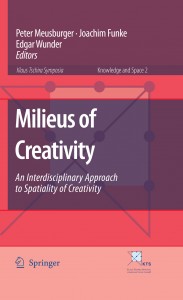Gerade ist ein von Peter Meusburger, Edgar Wunder und mir herausgegebener Band „Milieus of creativity“ erschienen, über den ich mich sehr freue. Es sind zum großen Teil überarbeitete Beiträge zur damaligen Konferenz „Knowledge and Space“ in der Klaus-Tschira-Stiftung, zum Teil aber auch speziell für diesen Band geschriebene Beiträge zum Thema Kreativität und räumliche Verteilung.
Aus der Verlagsankündigung:
„Milieus of Creativity“ is the second volume in the book series „Knowledge and Space“. This book deals with spatial disparities of knowledge and the impact of environments, space and contexts on the production and application of knowledge. The contributions in this volume focus on the role of places, environments, and spatial contexts for the emergence and perpetuation of creativity. Is environment a social or a spatial phenomenon? Are only social factors relevant for the development of creativity or should one also include material artefacts and resources in its definition? How can we explain spatial disparities of creativity without falling victim to geodeterminism?
This book offers insights from various disciplines such as environmental psychology, philosophy, and social geography. It presents the results of a research conference Knowledge and Space at Heidelberg University in September 2006, which was supported by the Klaus Tschira Foundation.
Die kreativen Milieus sind sehr interessant: Warum sind zu bestimmten Zeiten bestimmte Orte oder Regionen Brennpunkte intellektueller und künstlerischer Aktivitäten? Athen, Wien, Berlin, London, New York, Tokio: es ist nicht nur die Größe, sondern offensichtlich eine gute Mischung von Personen und Umgebungsmerkmalen. Selbst das einst so unaufregende Ruhrgebiet ist heute zu einem kreativen Schmelztiegel geworden. [Wenn man genau hinsieht, ist es auch nicht Berlin als Ganzes, sondern ein kleiner Ausschnitt, ein paar Stadtteile, bestimmte Straßenzüge und Viertel – viele andere Teile der Stadt passen nicht zu dieser Charakteristik.]
Warum zünden einige Universitäten permanent intellektuelle Feuerwerke, während andere eher wie Verwaltungshochschulen wirken und den Geist von Finanzämtern ausströmen? Was macht den Unterschied aus? Wie können wir bei uns kreative Potentiale freisetzen und nutzen? Spannende Fragen, zu denen die Schnittstelle von Psychologie und Geographie ein paar Antworten versucht. Die Beiträge der international renommierten Autoren schneiden vielfältige Aspekte an:
- Peter Meusburger, Joachim Funke and Edgar Wunder: Introduction: The Spatiality of Creativity
- Joachim Funke: On the Psychology of Creativity
- Robert J. Sternberg: Domain-Generality Versus Domain-Specificity of Creativity
- Dean Keith Simonton: Scientific Creativity as a Combinatorial Process: The Chance Baseline
- Günter Abel: The Riddle of Creativity: Philosophy’s View
- Hans Lenk: Creativity: Multidimensional Associative or Chaotic Process? Methodological Comments on Creative Processes and Metaphors in Aesthetics and Innovation
- Peter Meusburger: Milieus of Creativity: The Role of Places, Environments, and Spatial Contexts
- James C. Kaufman: Creativity, Intelligence, and Culture: Connections and Possibilities
- Scott G. Isaksen: Exploring the Relationships Between Problem-Solving Style and Creative Psychological Climate
- Ricarda Bouncken: Creativity in Cross-Cultural Innovation Teams: Diversity and Its Implications for Leadership
- Martina Fromhold-Eisebith: Space(s) of Innovation: Regional Knowledge Economies
- Jens Förster: The Unconscious City: How Expectancies About Creative Milieus Influence Creative Performance
- Margaret A. Boden: Conceptual Spaces
- Rob Kitchin: Looking at the Present Through the Future: Science-Fiction Urbanism and Contingent and Relational Creativity
- Barney Warf: Teleology, Contingency, and Networks
- Stephan Günzel: Geophilosophy and Creative Milieus
Mehr zum Buch unter http://www.psychologie.uni-heidelberg.de/ae/allg/mitarb/jf/creativity.html
